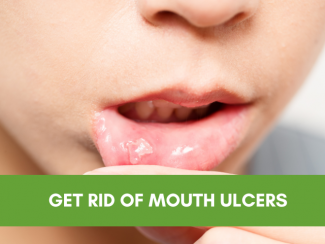
Oral health is not limited to your teeth alone. Mouth ulcers or sores can develop inside the mouth, cheeks, lips and tongue that can be extremely painful. Dr Shail Jaggi informs us on causes and symptoms of mouth ulcers and offers some advice on how to keep our mouth healthy, hygienic and problem free.
All of us have at some point experienced oral sores in the mouth. These are generally very unpleasant and extremely painful and will persist for a couple of days. These sores are called ulcers. The good news is that though most of these are very painful they are usually harmless and can clear up on their own in a week or two.
Mouth ulcers are usually round or oval sores that usually appear inside the mouth, on cheeks, lips and tongue. They can be white, red, yellow or grey in color and swollen. You may have a single sore or multiple sores at the same time making it that much more uncomfortable.
What causes a mouth ulcer?
In many cases, the reason for mouth ulcers is unclear. Most single mouth ulcers are caused by damage to the lining inside of the mouth. For example:
- accidentally biting the inside of your cheek, lip or a sharp tooth
- poorly fitting dentures
- hard food
- a defective filling
It’s not always clear what causes mouth ulcers that keep returning, but triggers are thought to include:
- stress and anxiety
- hormonal changes – some women develop mouth ulcers during their monthly period
- eating certain foods – such as hot food, chocolate, spicy foods, coffee, peanuts, almonds, strawberries, cheese, tomatoes and wheat flour.
- toothpaste containing sodium lauryl sulphate.
- stopping smoking – when you first stop smoking, you may develop mouth ulcers.
- Nutritional deficiencies – like deficiency of Vitamin B12, iron deficiency.
- Allergy to certain drugs like – penicillin, barbiturates.
- Viral infections – like Herpes zoster can cause ulcers which usually involves gums, tongue and palate associated with severe pain, hand-foot mouth disease.
- Weakened immune system – due to HIV or lupus.
How would one know if the ulcer is cancerous?
The sore that just won’t go away!
If your mouth ulcer has lasted for more than 3 weeks, it can be an indication for something more serious than just a regular ulcer that will heal on its own. It is advisable to visit your dentist, who will take a biopsy of your lesion to reach a diagnosis to make sure it’s nothing serious.
Bump in my mouth
Any bump or a swelling on the tongue or lip that doesn’t seem to be because of trauma, should be evaluated by your dentist. Bumps can also be seen on the inside of your cheeks, several reasons may cause these bumps and not all of them are signs of cancer, however this can best be decided by your dentist.
Other signs
If there is difficulty in chewing or swallowing, soreness of the tongue, numbness of the tongue or other areas of the mouth. A white or red patch in areas of the mouth that do not go away even after 3 weeks.
It's important to detect mouth cancer or other oral lesions as early as possible. If mouth cancer is detected early, the chances of a complete recovery are good. Regular dental check-ups are the best way to detect the early signs.
How to treat mouth ulcers?
Mouth ulcers don’t usually need to be treated, because they tend to heal by themselves within a week or two. However, treatment can help to reduce swelling and ease any discomfort. This may help if you keep getting mouth ulcers or your mouth ulcer affects eating and drinking.
The best way to treat an ulcer is patience!
Since these take about 7 or 10 days to heal it’s important to take palliative care which include
- Start Vitamin Supplements like Vit B12
- Use oral gels like Ora Care which will make eating more comfortable
- Keeping off spicy food for a couple of days
- Warm saline rinses
- Ulcers caused by Herpes zoster can be treated by atraumatic removal of plaque, dilute chlorhexidine rinses, antiviral drugs, plenty of rest and liquid diet
How to keep your mouth healthy?
- It is important to visit your dentist regularly, as often as they recommend, even if you wear dentures, especially if you smoke or drink, as they are one of the causes of ulcers in the mouth.
- While brushing your teeth look out for red or white patches in your mouth, or sores that do not heal within 2 weeks, and report to your dentist.
- A good diet, rich in Vitamins A, C and E provides protection against development of mouth cancers. Plenty of fruits and vegetables in the diet help to protect the body, in general, from most cancers.
- Cut down on smoking and drinking.
- Limit the stress in your life ….nothing is more important than your health in life!
- Smile away and be happy!
(Dr Shail Jaggi is a passionate dentist with specialisation in cosmetic dentistry and endodontics. She manages an Advanced Microscope Enhanced Practice – Dentalwiz dealing with all aspects of dentistry.)















